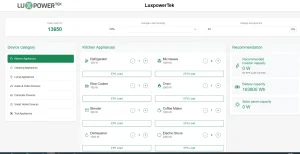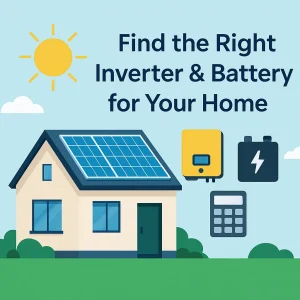Hoy en día, la mayoría de la gente quiere invertir en energía solar. Usar energía limpia, reducir las facturas de electricidad y prepararse para los cortes de luz tiene sentido. Sin embargo, suelen encontrarse con problemas al considerar la compra de un sistema de inversor solar. ¿Qué tamaño necesita? ¿Cuánta batería necesita? ¿Qué pasa si quiero alimentar el refrigerador y el router wifi?
Elegir el inversor y el tamaño de batería correctos es crucial para cualquier sistema de microrred. La mayoría de las personas, especialmente los principiantes, cometen errores en este aspecto. Esto genera problemas más adelante. O bien tienen que adaptarse a limitaciones en el uso de la electrónica, o bien desperdician mucha energía.
En LuxpowerTek, hemos desarrollado una solución para ayudarle. Nuestra Calculadora de tamaño de inversor solar y batería Ofrece una solución sencilla e intuitiva. Es mucho más fácil de usar y práctica. Aquí puede crear una lista de posibles configuraciones.
¿Por qué es esencial este cálculo de tamaño? En primer lugar, puede usar sus dispositivos electrónicos en casa con tranquilidad. Conoce la carga total de su hogar y la capacidad de su inversor y batería. En segundo lugar, tendrá una idea clara de si puede agregar dispositivos electrónicos en el futuro si así lo desea. Por lo tanto, independientemente del tipo de dispositivo electrónico que use, seleccionar el inversor y el tamaño de batería adecuados es crucial.
¿Cómo funciona la calculadora de tamaño de batería e inversor solar?

La calculadora de dimensionamiento de inversores solares y baterías de LuxpowerTek es sencilla y fácil de entender. Solo tiene que introducir la información de su instalación. Posteriormente, la herramienta le proporcionará la solución solar óptima para su proyecto.
Paso 1: Seleccione sus electrodomésticos
En el primer paso, especifica qué electrodomésticos quieres alimentar. Pueden ser cualquier electrodoméstico que uses a diario en casa. Simplemente selecciona los artículos de tu casa, como el refrigerador, las luces, el televisor o cualquier otro electrodoméstico relevante. La herramienta ya sabe cuánta electricidad consumen. No necesitas saber su potencia ni su consumo. La plataforma ya lo ha investigado por ti.
La calculadora entiende automáticamente el consumo de energía de tus electrodomésticos. Ya sabes que los refrigeradores se encienden y apagan, mientras que las luces permanecen encendidas. Este sistema inteligente ofrece recomendaciones precisas sin necesidad de conocimientos previos de electricidad. Solo tienes que marcar la casilla del dispositivo que sueles usar en casa. La calculadora se encarga de todos los cálculos complejos por ti.
Paso 2: Tiempo de energía de respaldo
En el primer paso, ha seleccionado algunos dispositivos específicos. Sabe cuánta carga puede soportar su casa durante los cortes de luz. Sin embargo, aún no ha determinado cuánto tiempo consumirá esta carga de la batería. En este paso, verificará qué le ayudará a elegir el tamaño correcto de batería.
La capacidad de la batería determina la duración de esta carga. La mayoría de las personas eligen una reserva de 2 horas. Sin embargo, si los apagones son frecuentes en su zona, podría necesitar una duración de 4 horas o más.
La calculadora solar le proporcionará una solución basada en su tiempo. Esta herramienta le sugerirá un tamaño de batería compatible con su tiempo.
Paso 3: Plan final
En el último paso, esta calculadora solar sugerirá un paquete que proporciona una solución integral para todo el equipo necesario para su instalación completa.
¿Cómo elegir electrodomésticos para energía de respaldo?

Cuando se va la luz, no puedes mantener todo funcionando. Pero sí puedes elegir lo más importante. Aquí tienes algunos consejos esenciales para seleccionar los electrodomésticos adecuados para tu sistema de energía de emergencia.
#1 Concéntrese primero en lo esencial
Primero, empieza por lo esencial. Estos son los electrodomésticos que te mantienen seguro, saludable y cómodo.
Tu refrigerador debería ser lo primero en esta lista. Sin electricidad, los alimentos pueden echarse a perder rápidamente. Unas pocas horas sin enfriar pueden echar a perder la leche, la carne y otros alimentos perecederos. Después, piensa en las luces. Puedes elegir una o dos luces para mayor seguridad por la noche.
Por supuesto, necesitará un cargador de teléfono o un router wifi. Internet es uno de los recursos que usamos a diario. Durante los cortes de luz, podría necesitar llamar a alguien para pedir ayuda o sufrir una emergencia. Si alguien en su hogar usa dispositivos médicos, también debe priorizarlos.
#2 Considere el tiempo de funcionamiento de los electrodomésticos con la capacidad de la batería
Algunos dispositivos consumen mucha corriente y agotan la batería muy rápidamente. Ignorar estos dispositivos en una configuración de energía de respaldo es mucho más eficiente y rentable.
Por ejemplo, el aire acondicionado de su casa suele tener una potencia de hasta 2 kW o 4 kW. Los aires acondicionados industriales tienen más potencia y son más eficientes. Puede usar ventiladores de techo o aires acondicionados portátiles en su hogar.
También siempre se necesitan luces y cargadores de teléfono, generalmente de menos de 100 vatios. Por otro lado, un refrigerador no consume energía continuamente. Enciende el compresor después de un tiempo y se apaga al alcanzar la temperatura deseada.
El inversor solar LuxpowerTek le mostrará cómo cada dispositivo afecta la batería. En función de esto, podrá añadir o quitar otros dispositivos.
#3 Piense en las necesidades únicas de su casa
Cada casa tiene necesidades diferentes. Por lo tanto, lo que necesites durante un apagón depende de tu estilo de vida.
¿Tienes un bebé en casa? Quizás necesites un calientabiberones o una lamparita. ¿Trabajas desde casa? Una laptop y wifi podrían ser más importantes. ¿Vives en una zona calurosa? ¿Tienes mascotas, como peceras?
#4 Prueba diferentes situaciones
Si no estás seguro, puedes probarlo varias veces con la calculadora solar. Empieza con lo básico, como un refrigerador, luces o un cargador de teléfono. Esto te ayudará a determinar la capacidad de la batería que necesitas. Después, puedes ir añadiendo más dispositivos gradualmente.
Reflexión final
Los cortes de electricidad son muy comunes en muchos países del mundo. Esta situación se da principalmente en pueblos de África y el Sudeste Asiático. Incluso hay lugares donde no hay electricidad. Los sistemas de energía solar son convenientes en estas zonas.
Debe seleccionar el dispositivo y el tamaño de batería correctos para el sistema de energía solar. Si lo hace usted mismo, deberá considerar muchos términos técnicos. Por supuesto, estos términos podrían resultarle difíciles si no los conoce. La calculadora LuxpowerTek realiza todos estos cálculos por usted.
Ante todo, siempre estamos abiertos a cualquier consulta experta. Contáctenos en cualquier momento; siempre estamos listos para ayudarle con su proyecto.

